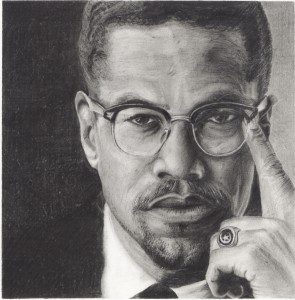Malcolm X is an unlikely spiritual paragon. But, he is.
Malcolm Little’s father was killed when he was six years old, and his mother was committed to a mental institution when he was thirteen. After bouncing from foster home to foster home, he fell onto the streets and into crime.
At the age of twenty, while serving a term in prison he discovered the Nation of Islam, to be frank, a cult based only marginally on Islam. On the other hand it offered him sobriety and a purpose. And he embraced it like a life raft in a raging sea. There he got a new name, Malcolm X.
He quickly rose to leadership. But at the same time he was increasingly aware of the problems within the Nation as well as how far its teachings were from authentic Islam. He delved deeply into the religion that the Nation had lifted its name from, and eventually converted. Within his conversion we find the beauty to be found in the Muslim faith, for him a major step in his deepening spirituality, now as Malcolm X, but also as Hajj-Malik El Shabazz.
This religion is not mine. But there is something compelling in it. And for African Americans, particularly black Americans in the mid nineteen sixties, the complicity of the Christian churches not only with slavery, but with its half life continuing at that point for just shy of a century, had soured many hearts with that tradition. Now, here was a religion that, while it has many, many shortcomings as well, at least preached racial unity from its inception. Still holding everyone to a sharp accountability, Malcolm X’s Islam was a path toward reconciliation of both the spirit and the world.
Sometime in 1963 he began collaborating on a memoir with Alex Haley.
And then it ended. On this day in 1965, he was assassinated by three members from the Nation.
But in a magical sort of way his work didn’t stop.
Mr Haley finished the project and the Autobiography of Malcolm X was published later that year.
The Wikipedia article on the book tells us “When the Autobiography was published, the New York Times reviewer described it as a ‘brilliant, painful, important book.’ In 1967, historian John William Ward wrote that it would become a classic American autobiography. In 1998, Time named The Autobiography of Malcolm X as one of ten ‘required reading’ nonfiction books. James Baldwin and Arnold Perl adapted the book as a film; their screenplay provided the source material for Spike Lee’s 1992 film Malcolm X.”
One could call it one of the great American spiritual narratives. If you haven’t read the Autobiography, you might find it worth while doing so. It is an indictment of white America. Brutally honest, with both himself and the world he found himself in. And at the same time the Autobiography sings a deep and authentic song of hope.
Because of his death people can speculate without consequence as to where his spiritual and political journey would take him.
Me, I like to think he would have found Sufism. There are aspects of his spiritual journey that suggest it could have been the culmination of the journey. But, of course, only a fond fantasy. Malcolm X’s life becomes one of those great ifs.
Kind of like ours at this moment. Where this choice or that dictates a whole different story going forward. Doors opening and closing, all depending on what we, that is you and I choose to do.
And isn’t that some strange and harsh blessing?













